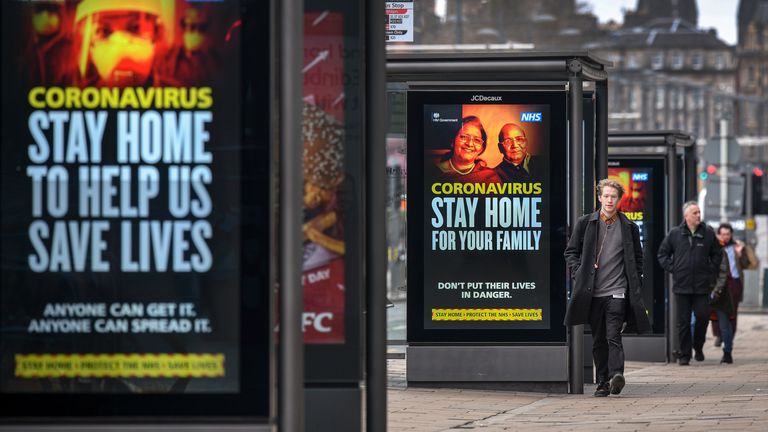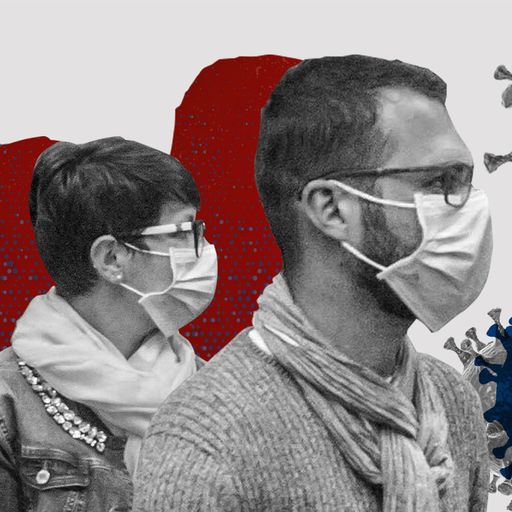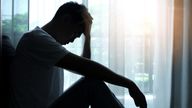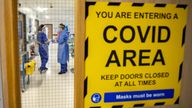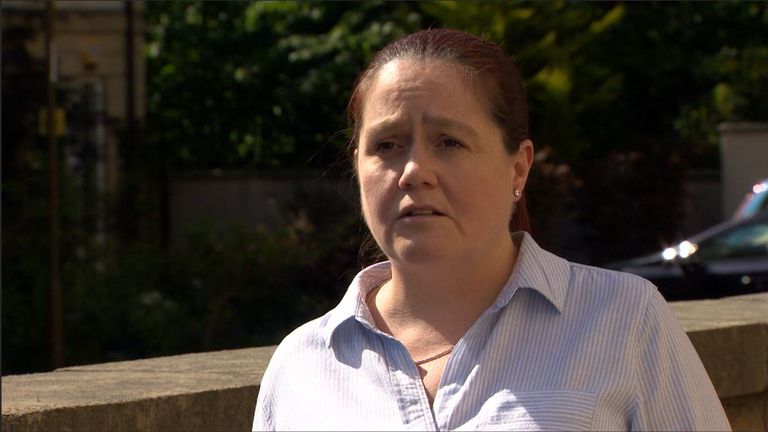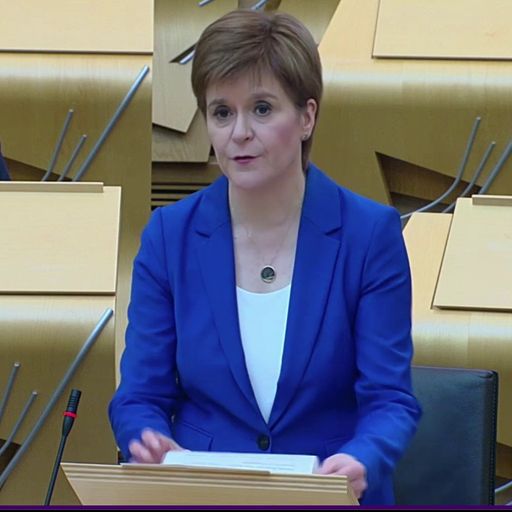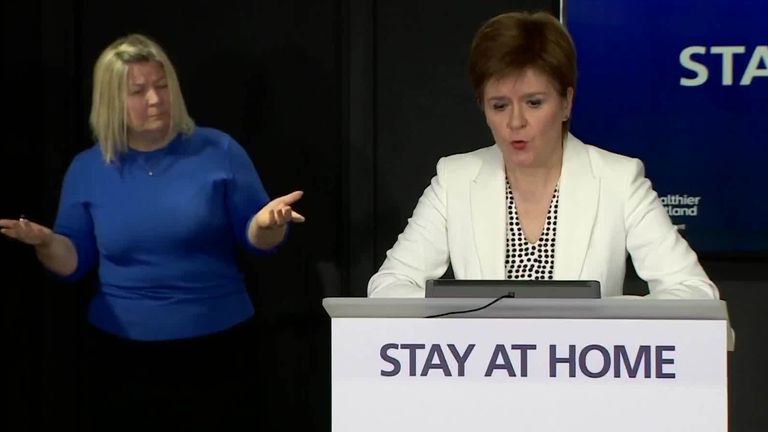Coronavirus: Kilt maker at virus-linked Nike conference fears she 'unwittingly spread COVID-19'
Gillian Russell tells Sky News she developed flu-like symptoms after coming into close contact with Nike delegation members.
Wednesday 27 May 2020 20:21, UK
A woman who fitted kilts for delegates at a Nike conference struck by a coronavirus outbreak has told Sky News she's angry and upset that the Scottish government kept it quiet.
Gillian Russell, 43, says she and other colleagues developed flu-like symptoms after coming into close contact with 10 members of the Nike delegation.
The Nike conference, which took place before cases were confirmed north of the border, has been dubbed "Scotland's ground zero" in the coronavirus spread.
In her first interview, Ms Russell told Sky News of her fears they may have unknowingly spread the virus as they were neither traced nor told of the Nike outbreak.
She said: "I'm quite angry and upset about it. I don't like the thought that I could have possibly infected someone without my knowledge. We were never informed.
"The worry is that somebody is actually infected and, possibly, died. Maybe not directly through contact with me but directly through contact via me - that I've spent time with someone who has then had a similar strain the way that I feel I have, that didn't make them ill, but then they've been with somebody that's been more vulnerable and it's actually really done damage and they've maybe died."
Ms Russell, a shop manager, helped to fit hire kilts for 10 Nike delegates, five men and five women on 24 February. Soon afterwards, she and several colleagues began to feel unwell.
She said: "I felt a bit fluey, a bit not right. I'm asthmatic, so I'd been finding I'd been taking my inhaler a lot more. There had been quite a lot of people as well that had similar symptoms, to the stage where we had people off sick.
"It was pretty much every day we had someone off sick with flu-like symptoms and, generally, just not feeling well. But even at that point, none of us were putting two and two together and thinking 'this is the coronavirus'. We just thought that there was maybe a bug going around."
She continued: "These were hire kilts. You need to make sure everything sits right, so you're completely up personal with someone, you've got your arms round them, you're fitting the kilt, you're moving the straps and things with them, showing them how to lace their shoes. So you are very close for a prolonged period of time."
Neither Ms Russell nor her colleagues were contact-traced following the kilt-fitting. She hasn't been tested for coronavirus and, therefore, can't be sure if that was the source of illness in her workplace.
The Nike conference took place at the end of February at the Hilton Carlton Hotel in North Bridge, Edinburgh. It was attended by 70 Nike delegates from around the UK and abroad.
:: Listen to the Daily podcast on Apple Podcasts, Google Podcasts, Spotify, Spreaker
At least 25 people linked to the event subsequently tested positive for coronavirus. Scotland's first COVID-19 case was confirmed on 1 March.
The Scottish government made no announcement regarding the Nike outbreak at the time it learned of it, and the news was only made public via the media six weeks later.
"That was the first I'd known anything about it," Ms Russell said.
"It was quite a shock - I turned and said to my partner 'I was involved in that, I fitted kilts for these people. I was up close and personal for about an hour with them'".
Ms Russell says that, had she known of her possible exposure to coronavirus, she would not have risked exposing others. In subsequent weeks, she spent time with elderly relatives, attended a retirement party, and flew on holiday to Portugal with her partner.
"I wouldn't have spent time with my dad before I went on holiday, I wouldn't have spent time with my partner's mother, I wouldn't have put them at risk. I would never have got on the plane. It was a full plane to Portugal, I would never have done that."
"We met people on holiday, we sat at tables with people, we made friends on holiday. You're getting close to people that maybe you shouldn't have. The retirement do, I wouldn't have gone to. I would never have put myself in that situation where we're sitting close to people that were at risk. I would have kept myself at home, I would have isolated and made sure that I wasn't putting anybody else at risk."
She added: "It's very hard and that's the main reason that I wanted to come forward. You're constantly thinking about 'what if I'd known, what would have been different, how would it have been different, how would cases have spread in Edinburgh, would it have been as bad, would our R number be lower?'
"Until we get those questions answered we're never going to know."
Already, concern at the silence has been expressed by a number of people who came into contact with the Nike delegates.
Twenty employees of Lloyds Banking Group had a training day in the same hotel, at the same time, and shared communal facilities. Three tour guides took the Nike delegates on a walking tour of Edinburgh's Old Town.
Scotland's First Minister Nicola Sturgeon has previously said that no details of the outbreak were revealed on the grounds of patient confidentiality.
Ms Russell said: "It's wrong. They've kept things from us, they should have been a lot more upfront and honest. They should have told us when the cases broke at the conference if they were unable to trace everybody that people had been in contact within Edinburgh.
"Edinburgh's such a massive city, it's a tourist city, there's thousands of people flock daily that people will have been to - restaurants, bars - and these people have been in contact with them. At least if people had known, to be able to come forward, then we could've actually maybe held (the number of infections) back a bit."
A Scottish Government spokesperson said: "The Scottish Government has been entirely consistent in its handling and publication of information relating to positive cases of COVID-19 in Scotland, and claims to the contrary in regard to the Nike issue are simply wrong.
"All appropriate steps were taken to ensure public health was protected, with more than 60 contacts traced in Scotland, and around 50 others traced in England. All of the cases linked to this event were assessed by their close contact, or contact with conference delegates who tested positive after the event so public health authorities were satisfied there was minimal infection risk and did not consider it necessary to issue a public health notice."
Ian Murray, Labour MP for Edinburgh South, told Sky News: "Gillian's personal story exposes why the SNP government made a fundamental error by deciding not to tell the public about this outbreak.
"Not only was Gillian ill after fitting delegates for kilts with no idea why, she was at risk of passing this on to relatives and people she was in contact with.
"She deserves answers from Nicola Sturgeon. Why did you cover-up this outbreak, why did you keep people like Gillian in the dark, and why did your government not seek the help of the public so that all people potentially infected could have been contact traced?".
Meanwhile, the number of people who died with confirmed or suspected COVID-19 in Scotland has fallen for a fourth consecutive week.
A total of 3,779 coronavirus-related deaths have been recorded as of 24 May, according to National Records of Scotland (NRS) figures.

